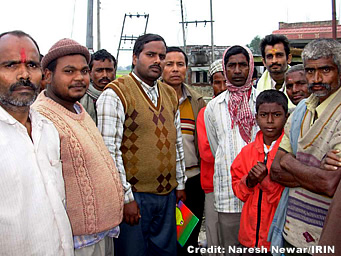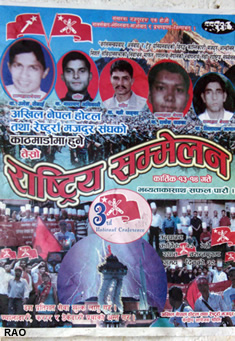Political parties and top government officials have called for calm amid concerns over increasing violence and tensions in Nepal's agricultural and industrial heartland, the lowland Terai region of southern Nepal.
''Communal tension is in danger of growing and this is being sparked by those forces who don't want the elections to take place.'' Riots The killing of pro-Madhesi leader Mohit Khan of the Democratic Madhesi Front in Shivapur village of Kapilvastu, nearly 200km southeast of Kathmandu, by an unknown group on 16 September led to a violent riot by Khan's supporters. According to local human rights groups, the assailants attacked and vandalised vehicles and shops run by the local Pahade people. "Communal tension is in danger of growing and this is being sparked by those forces who don't want the elections to take place," said a local government official requesting anonymity. Rights activists, who requested anonymity for fear that they would also be targeted, are concerned that if communal conflicts are not controlled, tensions could flare up and lead to very tragic incidents. Over the past nine months, pro-Madhesi groups have been staging demonstrations to demand greater political rights, autonomy and proportional representation. Radical Madhesi groups want the elections to fail so as to put pressure on the government and political parties, according to rights groups, politicians and government officials interviewed by IRIN. Rights activists are particularly concerned about the increase in the number of militant Madhesi groups that have been targeting Pahades. Furthermore, according to a recent security situation update report by the UN Office for the Coordination of Humanitarian Affairs (OCHA), militant groups like the two factions of Janatantrik Terai Mukti Morcha (JTMM-Jwala Singh and JTMM-Goit) have warned civil servants not to take part in any preparations for the elections. So far, only the Madhesi People's Rights Forum (MPRF) and Madhesi Mukti Tigers (MMT) have agreed to participate in the polls, saying they would benefit the Madhesi community. Security Government officials said they had been working to provide security to ensure an appropriate environment for elections. The government has begun implementing the first phase of its security plan for the elections by dispatching members of the Armed Police Force (APF) to 156 constituencies, OCHA said. "The government alone cannot do everything. There is also a need for unity and consensus among the often quarrelsome political parties," said activist Kundan Aryal from the prominent local rights group, Informal Sector Service Centre (INSEC).
Copyright © UN Office for the Coordination of Humanitarian Affairs 2007 [ This report does not necessarily reflect the views of the United Nations] Integrated Regional Information Networks (IRIN), part of the UN Office for the Coordination of Humanitarian Affairs (OCHA).
|






